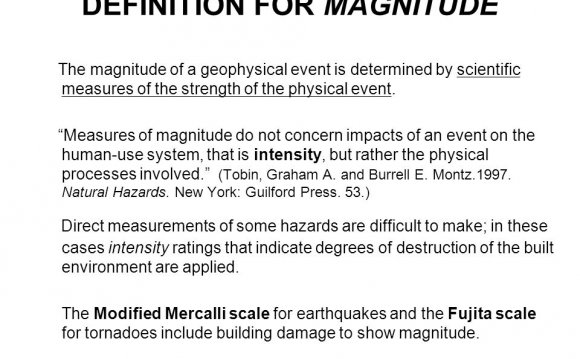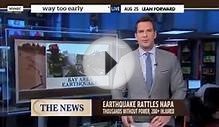
- Before the magnitude-7.0 earthquake devastated Haiti, killing 220, 000 people, the country was the poorest in the Americas.
- Tempest, hurricane, tidal wave, tsunami, earthquake, or Big Bang?
- The 1985 Mexico City earthquake, which killed 10, 000, sent Alarma!
- In 2010 he claimed that a U.S. weapons test caused the devastating Haitian earthquake, which claimed some 230, 000 lives.
- "One of the best things for David Wu is the earthquake in Japan, " Moore said.
Historical Examples
- It is clear that in such an earthquake, Mallet's method would utterly fail in giving definite results.
- Though not quite so terrible as an earthquake, it was a fearful monster to behold.
- They are only a gigantic edition of those pink and white terraces not long ago destroyed by earthquake in New Zealand.
- In the hour of the earthquake, no one heeds the croak of the raven.
- The great audience almost leaped to its feet at the sound of that tempest and earthquake.
British Dictionary definitions for earthquake
earthquake
noun 1.a sudden release of energy in the earth's crust or upper mantle, usually caused by movement along a fault plane or by volcanic activity and resulting in the generation of seismic waves which can be destructive related adjective seismic
Collins English Dictionary - Complete & Unabridged 2012 Digital Edition© William Collins Sons & Co. Ltd. 1979, 1986 © HarperCollins
Publishers 1998, 2000, 2003, 2005, 2006, 2007, 2009, 2012
Cite This Source
Word Origin and History for earthquake
n.late 13c., eorthequakynge, from earth + quake (n.). In this sense Old English had eorðdyn, eorðhrernes, eorðbeofung, eorðstyren.
earthquake in Science
earthquake (ûrth'kwāk')A sudden movement of the Earth's lithosphere (its crust and upper mantle). Earthquakes are caused by the release of built-up stress within rocks along geologic faults or by the movement of magma in volcanic areas. They are usually followed by aftershocks. See Note at fault.
Our Living Language: Fractures in Earth's crust, or lithosphere, where sections of rock have slipped past each other are called faults. Earthquakes are caused by the sudden release of accumulated strain along these faults, releasing energy in the form of low-frequency sound waves called seismic waves. Although thousands of earthquakes occur each year, most are too weak to be detected except by seismographs, instruments that detect and record vibrations and movements in the Earth. The point where the earthquake originates is the seismic focus, and directly above it on Earth's surface is the earthquake's epicenter. Three kinds of waves accompany earthquakes. Primary (P) waves have a push-pull type of vibration. Secondary (S) waves have a side-to-side type of vibration. Both P and S waves travel deep into Earth, reflecting off the surfaces of its various layers. S waves cannot travel through the liquid outer core. Surface (L) waves—named after the nineteenth-century British mathematician A.E.H. Love—travel along Earth's surface, causing most of the damage of an earthquake. The total amount of energy released by an earthquake is measured on the Richter scale. Each increase by 1 corresponds to a tenfold increase in strength. Earthquakes above 7 on the Richter scale are considered severe. The famous earthquake that flattened San Francisco in 1906 had a magnitude of 7.8. The American Heritage® Science Dictionary
The American Heritage® Science Dictionary
Copyright © 2002. Published by Houghton Mifflin. All rights reserved.
Cite This Source
earthquake in Culture
earthquake definition
A tremor of the surface of the Earth, sometimes severe and devastating, which results from shock waves generated by the movement of rock masses deep within the Earth, particularly near boundaries of tectonic plates. (See fault, Richter scale, and seismology.)
Note: Earthquakes are particularly likely where such plates are sliding past each other, as in the San Andreas Fault.Note: Earthquakes cannot be accurately predicted, although the likelihood of a region's suffering an earthquake can be estimated. The American Heritage® New Dictionary of Cultural Literacy, Third EditionCopyright © 2005 by Houghton Mifflin Company.
Published by Houghton Mifflin Company. All rights reserved.
Cite This Source
earthquake in Technology
(IBM) The ultimate real-world shock test for computer hardware. Hackish sources at IBM deny the rumor that the San Francisco Bay Area quake of 1989 was initiated by the company to test quality-assurance procedures at its California plants.
[Jargon File]
(1995-04-22)
earthquake in the Bible
mentioned among the extraordinary phenomena of Palestine (Ps. 18:7; comp. Hab. 3:6; Nah. 1:5; Isa. 5:25). The first earthquake in Palestine of which we have any record happened in the reign of Ahab (1 Kings 19:11, 12). Another took place in the days of Uzziah, King of Judah (Zech. 14:5). The most memorable earthquake taking place in New Testament times happened at the crucifixion of our Lord (Matt. 27:54). An earthquake at Philippi shook the prison in which Paul and Silas were imprisoned (Act 16:26). It is used figuratively as a token of the presence of the Lord (Judg. 5:4; 2 Sam. 22:8; Ps. 77:18; 97:4; 104:32).
Pre order august batch iceriver kas ks1.
YOU MIGHT ALSO LIKE












